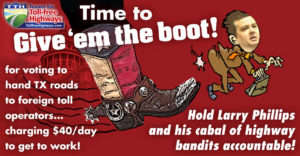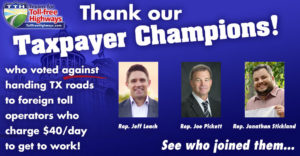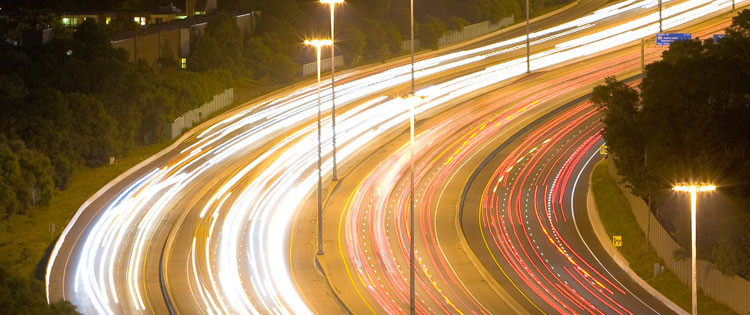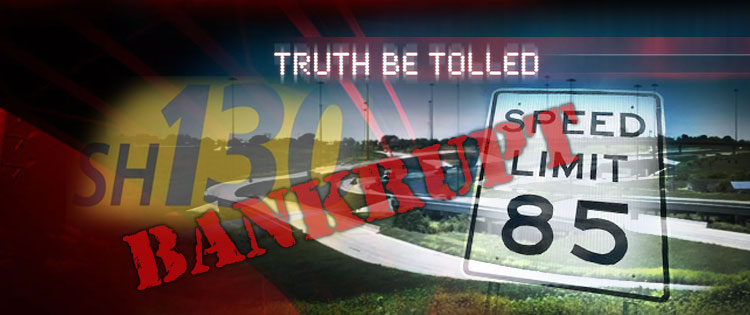Those who voted to hand 19 TX roads to private, foreign toll operators are:
Yeas 51 — Allen; Alonzo; Alvarado; Are´valo; Blanco; Burkett; Button; Coleman; Collier; Cortez; Elkins; Farrar; Flynn; Geren; Giddings; Gooden; Guerra; Gutierrez; Hernandez; Howard; Huberty; Israel; Johnson, E.; King, K.; King, P.; Koop; Longoria; Lucio; Martinez; Moody; Morrison; Murphy; Neave; Oliveira; Ortega; Perez; Phillips; Raymond; Rodriguez, E.; Rodriguez, J.; Rose; Sheffield; Shine; Smithee; Thompson, E.; Thompson, S.; Turner; Uresti; Villalba; Walle; Workman.
Taxpayer champions who voted against are:
Nays 82 — Anderson, C.; Anderson, R.; Bailes; Bell; Biedermann; Bohac; Bonnen, D.; Bonnen, G.; Burns; Burrows; Cain; Canales; Capriglione; Clardy; Cosper; Craddick; Cyrier; Dale; Darby; Dean; Deshotel; Dukes; Dutton; Faircloth; Fallon; Frank; Frullo; Goldman; Gonzales; Gonza´lez; Hefner; Herrero; Holland; Hunter; Isaac; Kacal; Keough; King, T.; Klick; Krause; Lambert; Landgraf; Lang; Larson; Laubenberg; Leach; Lozano; Metcalf; Meyer; Miller; Mun˜oz; Murr; Neva´rez; Oliverson; Parker; Paul; Phelan; Pickett; Price; Raney; Reynolds; Rinaldi; Roberts; Romero; Schaefer; Schofield; Schubert; Shaheen; Simmons; Springer; Stephenson; Stickland; Stucky; Swanson; Thierry; Tinderholt; VanDeaver; White; Wilson; Wray; Zedler; Zerwas.
Absent, Excused — Anchia; Paddie; Wu.
Absent, Excused, Committee Meeting — Ashby; Davis, S.; Davis, Y.; Sanford.
Absent Unexcused — Bernal; Cook; Gervin-Hawkins; Guillen; Hinojosa; Johnson, J.; Kuempel; Minjarez; Vo.
Source: House Journal Recorded Vote
See press release: VICTORY: Grassroots KILL private toll bill, secure Abbott’s vision for toll-free future





 While the politicians argued eminent domain would only be used as a last resort, that’s the club TTC’s CEO John Crew needs to get landowners to sign over their land in negotiated settlements. We’ve seen it used prolifically — sign on the dotted line for the amount we’re offering or we’ll take it with eminent domain and pay you even less.
While the politicians argued eminent domain would only be used as a last resort, that’s the club TTC’s CEO John Crew needs to get landowners to sign over their land in negotiated settlements. We’ve seen it used prolifically — sign on the dotted line for the amount we’re offering or we’ll take it with eminent domain and pay you even less.